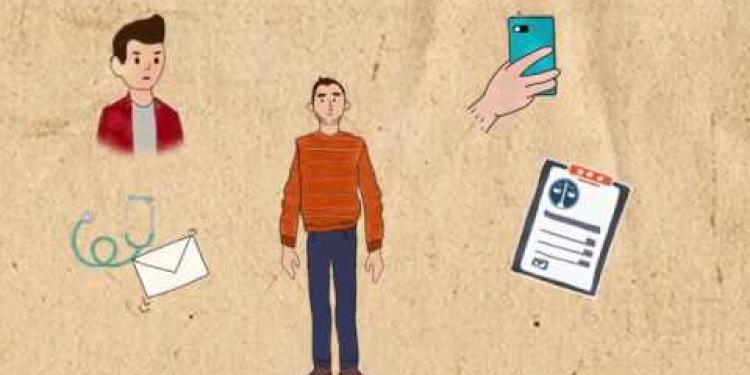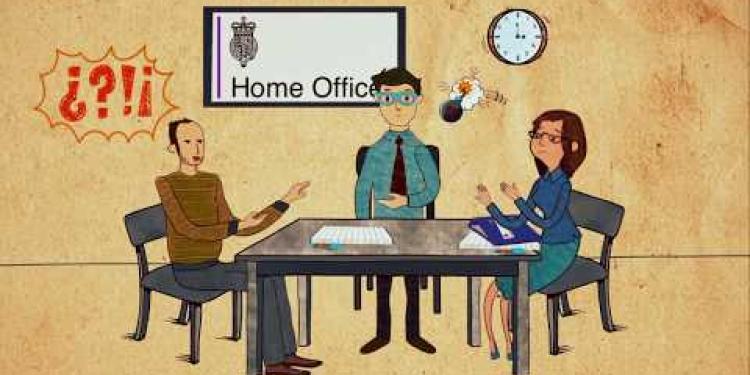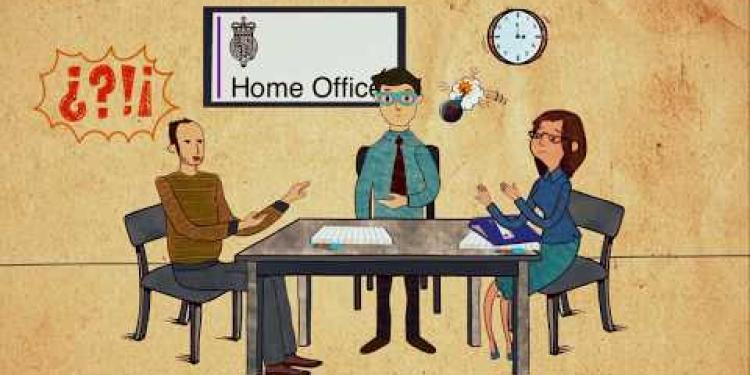Important Information On Using This Service
- Ergsy carefully checks the information in the videos we provide here.
- Videos shown by YouTube after a video has completed have NOT been reviewed by ERGSY.
- To view, click the arrow in the center of the video.
Using Subtitles and Closed Captions
- Most of the videos you find here will have subtitles and/or closed captions available.
- You may need to turn these on and choose your preferred language.
Turn Captions On or Off
- Go to the video you'd like to watch.
- If closed captions (CC) are available, settings will be visible on the bottom right of the video player.
- To turn on captions, click settings.
- To turn off captions, click settings again.
Find A Professional
Videos from Ergsy search
An Introduction to Claiming Asylum in the UK
Understanding Asylum
Asylum is a form of protection given by a country to foreign nationals who have fled persecution or serious harm in their own country. In the UK, the right to seek asylum is protected under international law, particularly the 1951 United Nations Convention Relating to the Status of Refugees and its 1967 Protocol.
Who Can Apply?
Anyone who is outside their country of nationality or habitual residence and is unable or unwilling to return because they fear persecution due to race, religion, nationality, political opinion, or membership in a particular social group can apply for asylum. This also includes those facing serious harm such as torture or threats to life.
The Application Process
To apply for asylum in the UK, an individual must make their claim in person at the port of entry (such as an airport or seaport) or at the UK Home Office in Croydon. The process involves an initial screening interview, where basic information is collected, followed by a substantive interview where more detailed questions about the applicant's situation are asked.
After the Application
While waiting for a decision, asylum seekers may be housed by the Home Office and receive a small weekly allowance. They are generally not allowed to work but can apply for permission to work if their case has not been resolved within a year. Once a decision is made, applicants will either be granted refugee status, humanitarian protection, or other leave to remain, or they may face refusal and potential removal from the UK.
Support and Legal Assistance
Claiming asylum can be a complex and daunting process. Applicants are encouraged to seek legal assistance from solicitors or organizations specializing in immigration law. Charities and support groups can also provide essential help and emotional support during this time. Being well-informed and prepared can significantly improve the chances of a successful asylum claim.
Frequently Asked Questions
What is asylum?
Asylum is a form of international protection given by a country to foreign nationals who have fled their own country due to fear of persecution based on race, religion, nationality, membership of a particular social group or political opinion.
Who can claim asylum in the UK?
Anyone who is in the UK or at its borders can claim asylum, but they must be able to show that they have a genuine fear of persecution in their home country.
How do I apply for asylum in the UK?
You must make your application to a Home Office representative either at the border upon entry or once you are already in the UK. It’s best to seek legal advice before applying.
What documents do I need to apply for asylum?
Typically, you will need to provide identity documents such as a passport, as well as any other documentation that supports your asylum claim, such as evidence of persecution and reasons you cannot return to your home country.
Where will I live while my asylum claim is being processed?
You may be housed in asylum seeker accommodation provided by the Home Office, or you may live with friends or family if you have them in the UK.
Can I work while my asylum application is being processed?
Asylum seekers are generally not allowed to work while their application is being processed. You may be able to apply for permission to work if you have waited over 12 months for an initial decision.
What support am I entitled to as an asylum seeker?
You may be entitled to financial support and accommodation if you are destitute and do not have the means to support yourself.
How long does the asylum process take?
The length of the process can vary widely. While the Home Office aims to make a decision within six months, some cases can take much longer.
What is a screening interview?
A screening interview is the initial meeting with the Home Office where basic information about you and your reasons for seeking asylum are recorded.
What happens if my asylum claim is accepted?
If your claim is accepted, you will be granted refugee status or another form of protection, allowing you to stay in the UK for a certain period, usually five years, after which you can apply to settle permanently.
What if my asylum claim is refused?
If your claim is refused, you may appeal the decision or submit new evidence if circumstances change. Otherwise, you may have to leave the UK.
Can my family join me if I am granted asylum?
Yes, if you are granted refugee status, your immediate family members (spouse and children under 18) can apply to join you in the UK.
Will I receive healthcare while my asylum claim is processed?
Yes, asylum seekers are entitled to NHS healthcare, including registration with a GP and access to emergency treatment.
Can I travel outside the UK while my asylum claim is processed?
You should not travel outside the UK while your asylum claim is being processed, as this may be taken as evidence that you are not genuinely in need of protection.
What happens during an asylum interview?
During the substantive asylum interview, a Home Office caseworker will ask detailed questions about your reasons for seeking asylum, including your personal history and any evidence of persecution.
Useful Links
Useful links from: The asylum screening interview
- NHS Inform NHS Inform provides comprehensive information on health rights for asylum seekers and refugees in Scotland, detailing what you need to know about accessing healthcare services.
- Refugee Council The Refugee Council is a UK-based charity offering support and advice on health and wellbeing for refugees and asylum seekers, including information on the asylum screening interview process.
- UK Government - Asylum Screening Unit Official UK government page providing details on the asylum screening process, including what to expect during the interview and what documents to bring.
- Migrant Help UK Migrant Help offers support and guidance to asylum seekers and refugees in the UK, including details on the asylum screening interview and other necessary services.
Have you found an error, or do you have a link or some information you would like to share? Please let us know using the form below.
- Ergsy carfully checks the information in the videos we provide here.
- Videos shown by Youtube after a video has completed, have NOT been reviewed by ERGSY.
- To view, click the arrow in centre of video.
- Most of the videos you find here will have subtitles and/or closed captions available.
- You may need to turn these on, and choose your preferred language.
- Go to the video you'd like to watch.
- If closed captions (CC) are available, settings will be visible on the bottom right of the video player.
- To turn on Captions, click settings .
- To turn off Captions, click settings again.


